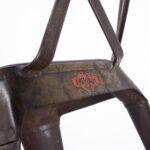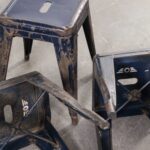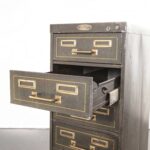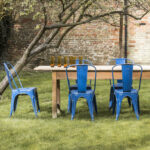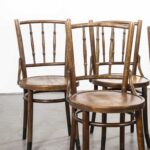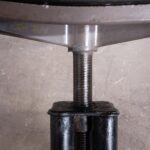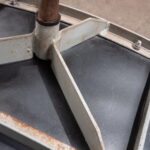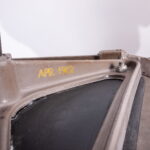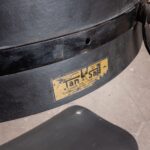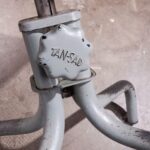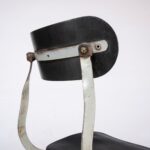When we started this Merchant & Found gig a few years ago, we were driven by our passion (polite way of saying obsession!) for some of the famous makers in the furniture and lighting world, principally the makers that were born at the turn of the Twentieth Century, the industrial pioneers. We had some knowledge but have been stunned and delighted to discover so many amazing makers we just didn’t know about. If you take bentwood chairs as an example, we knew Thonet and Ton really well, but we hadn’t heard of Baumann, Fischel or Luterma and uncovering this history has (along with meeting so many amazing customers and suppliers) been one of our greatest pleasures over the last few years. Google is a pretty useful tool but you have to dig deep and really unpick the history to put it all together, we are talking huge industrial producers who were major contributors to the development of the home interiors over the last one hundred or so years, yet their history is almost gone and forgotten. The list goes on, Benjamin lighting, Esavian, Strafor, Fibrocit or Evertaut, just to name a few. We have honed our mission, we want to champion these amazing makers, we want to sell their vintage products but we want to champion their history and provenance along side everything we sell. Why just buy a vintage chair, why not sit on a chair with history, a chair with a makers mark, a survivor of an incredible phase in our industrial history.
We have a romantic core so uncovering these old makers has definitely got a bit of an Indiana Jones vibe (we kid ourselves honestly) but it does feel like that, finding dusty old catalogues, crawling under piles of chairs to find the makers label and simply just hunting out this history. These makers made some incredible products and it just seems a travesty that this history might be lost so our simple mission is to do our best to authenticate pieces, to unearth the history, to record it and share it. We have a crazy romantic notion that one day we might put it all in a book, but one step at a time.
So what’s the ‘next phase’ we hear you ask? Simple, we love vintage but above and beyond that we love these makers and what they stand for and step by step we want to tell their wider story, not just the ones that have sadly stopped trading but (drum roll…) we want to start discussing the makers that have survived. So without further ado we are incredibly proud and excited to say we are now working with two amazing French makers that have survived and are still trading today, Tolix and Nicolle. Put simple we want to champion these brands, to tell the brand story, to be the best place to come and buy vintage Tolix and Nicolle but also to sell brand new (just made) genuine Tolix and Nicolle. Yes we love their vintage products but above all what we love is their incredible products, their history, their drive to survive and we want to be part of that. So from today, we are official distributors of these two incredible brands. We have a huge amount of work to do with our website but over the coming weeks and months we will be loading all the contemporary products that Tolix and Nicolle make today and you won’t be surprised to hear that of course they still produce their iconic classics but they also keep driving their brands forward working with new bold designers to keep creating great products for the next one hundred years.
Over the coming weeks and months we will share more insight in to these incredible makers, their history and their current product range but in the meantime if you want a Tolix or Nicolle product we can supply you both vintage products and anything from their current ranges. Until we have the full product ranges loaded on our website please contact us and we will do our best to help supply you with any product from these two incredible makers.paul@merchantandfound.com
With best wishes
Merchant & Found
Tan-Sad began life in 1922 in Birmingham and was first publicly listed as an exhibitor at the British Industries Fair, selling typists tables, constructional toys, motor cycle chairs, perambulators and office and factory chairs. Tan-Sad Continued to grow over the coming years and essentially split its Birmingham production between push chairs and toys, and a very successful range of factory and office seating.
In the 1950’s and 1960’s Tan-Sad became a generic name for pushchairs and traditional perambulators before it’s demise in 1975. Ask a certain older generation and they will still to this day refer to a pushchair as a ‘Tan-Sad’. The original meaning behind the name is believed to come from the French word Tansad, meaning the extra or pillion seat behind a horse or motorcycle. Sadly little more than this is known about Tan-Sad except for various vintage advertising and of course vintage products that have survived. Our interest lies mainly in the iconic machinists chairs that were mass produced from the 1930’s onwards, competing head on with Evertaut in England as well as a number of big European manufacturers.
The machinists chair was born from the use of industrially produced steel tube that post the First World war was produced in such scale that it became a key new material in furniture production. The Bauhaus school was one of the pioneers of its commercial use in seating. The early Tan-Sad chairs are iconic in their use of vulcanised cardboard for the seats and backs. A tough and practical material that was suited to the harsh environment of the factory floor. With no fabric upholstery it could be cleaned with a damp cloth, was fairly resistant to fire, and yet would gently mould to a comfortable shape.
We have been lucky to recently come across a batch of early machinists chairs in exceptional condition and are able to pick out the key highlights from the early 1940’s production. The seats swivel and are height adjustable using a basic locking screw and pin that wedges into a channel cut into the seat upright, as time progressed (in the late 1950’s) this system was updated and the seat swivelled and adjusted on a threaded base, reducing cost by (sadly) removing the need for the lovely Tan-Sad branded adjusting handle. The seat bases were originally made from welded steel but this too was replaced with a mass production cast base in the late 1950’s. Interestingly throughout these changes the original and highly practical vulcanised cardboard remained as did the lovely rubber bumpers used behind the curved back rest to cushion the attachment of the backrest to the main frame and allow some movement.
Our interest lies mainly in the machinists chairs of which many varieties exist although the model shown below is the best know. Very occasionally you will see an original 1920’s horse hair stuffed and upholstered version, if you do, snap it up it’s a rare part of our industrial heritage.
Help us champion recording the history of these iconic industrial brands. If you can help us in our mission please get in touch!
- test


